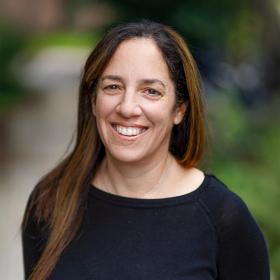



The aim of Yale Planetary Solutions may seem lofty: finding solutions to the world’s most pressing environmental problems. But the initiative, under the leadership of Julie Zimmerman, is doing just that by seeking to drive planetary solutions through all that Yale is—from its students, faculty, staff, and alumni to its buildings, collections, and campus—and all that Yale does—teaching, learning, researching, building, operating, convening, investing, and leading.
As the inaugural vice provost for planetary solutions at Yale, Zimmerman is helping to create new pathways for expanding, sharing, translating, and implementing knowledge on critical climate and sustainability challenges across the world and right here on campus. “Having the provost’s support changes the nature and character of this kind of work on campus and throughout the Yale community. It sends a message about Yale’s commitment to advancing solutions to planetary challenges,” says Zimmerman.
Zimmerman brings to this role a tremendous background in university leadership. When appointed, she was the senior associate dean for academic affairs at the Yale School of the Environment (YSE) and held professorship appointments at both YSE and the School of Engineering & Applied Science. As a researcher, she has pursued sustainable technology and engineering, including publishing the 12 Principles of Green Engineering with Paul Anastas, the Teresa and H. John Heinz III Professor in the Practice of Chemistry for the Environment at YSE. Zimmerman has served as the deputy director for the Center for Green Chemistry and Green Engineering at Yale and has held leadership positions in both national and international research consortia. In addition, she teaches in the Yale School of Management’s Executive Education program on sustainability and leadership and is editor-in-chief of the highly cited scientific journal Environmental Science & Technology. She was elected as a member of the National Academy of Engineering in 2025.
Big Ideas, New Innovations
“I’ve always been really interested in trying to solve wicked problems—from removing CO2 from the atmosphere and putting it to productive use, to driving new research directions at the intersection of environmental quality and human health,” Zimmerman says. Currently, her research includes converting biobased and waste feedstocks into valuable fuels and chemicals, developing safer and more sustainable chemical products and processes, and designing policies to enhance sustainable innovation.
“Now, as vice provost of planetary solutions, I can broaden my scope, looking beyond my lab or my department, or even my schools,” she says. “The question is: How do we come together as a university and bring all Yale has to offer to solving these challenges? How do we encourage faculty to go after big ideas and new innovations? What knowledge and training do our students need to be effective environmental leaders?”
Zimmerman notes that it’s critical to be clear that Yale will do all that it can, but that we all must be working on these efforts—not only across campus, but around the world. “We’re not showing up and saying: ‘Here’s the solution,’” Zimmerman says. “Rather we have to approach this with humility. The Yale community will engage with partners and stakeholders to create and translate knowledge into action and positive impact.”
Several Yale solutions have shown promise so far. Researchers at the Yale Center for Natural Carbon Capture have been investigating the potential for using natural processes like rock weathering to remove carbon from the atmosphere. The Tobin Center for Economic Policy, in collaboration with the Energy Sciences Institute and YPS, has launched the Energy Science and Policy Program to develop solutions for clean energy. And ClimateHaven, a climate tech incubator whose creation was supported by the university, has helped launch companies such as Oxylus Energy, which is developing carbon-neutral fuels and recently raised $4.5 million in seed funding.
Yale on the World Stage
In fall 2024, Zimmerman led the effort to bring a cohesive Yale presence to Climate Week NYC. Yale @ Climate Week featured more than thirty events at the Yale Club of New York across four days.
“Climate Week NYC was a perfect opportunity to share the impactful work we’re doing on campus with our broader regional community as well as leaders from around the world who were in New York for the UN General Assembly,” Zimmerman says. The initiative brought together nearly 1,200 faculty, staff, alumni, and guests to hear visionaries including former Secretary of State John Kerry ’66, Senator Sheldon Whitehouse ’78, California Attorney General Rob Bonta ’93, ’98 JD, and investor and author Tom Steyer ’79.
Collaborating for Impact
Zimmerman’s ambition for YPS is to provide both infrastructure and opportunities for the exceptionally talented members of the Yale community to pursue new interdisciplinary responses to the greatest challenges of our time.
“We have a lot of stars at Yale but not a lot of constellations,” Zimmerman says. “At Yale Planetary Solutions, we imagine ourselves to be a constellation factory—working to bring together novel synergies and strengthening existing connections across campus and with stakeholders to enable ever more impactful problem solving.”
To enable this critical work at the speed required, Zimmerman asks, “How do we go more quickly from knowledge creation to actually having an impact?” By providing support, infrastructure, and inspiration, she aims for Yale Planetary Solutions to bring all of Yale to bear on the most important problems of our age.
